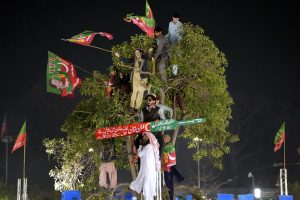The ongoing political deadlock among major parties in Pakistan has also become a constitutional crisis. With key political leaders of the country unwilling to set aside their differences to find a solution to holding general elections and agree on running the affairs of the state amicably, Pakistan’s democracy and governing institutions are in serious trouble.
Unfortunately, rather than reaching a consensus, the country’s political leaders are focused on overpowering each other to hold on to or return to power. So deep is the current political crisis that political rivals are openly declaring that this is a battle in which only one party or the other will survive.
In an interview on Sunday with a local news channel, Interior Minister Rana Sanaullah, a senior leader of the Pakistan Muslim League-Nawaz, linked peace in the country with the ouster of former Premier Imran Khan from politics. He said that the Pakistan Tehreek-e-Insaf (PTI) chief had steered his political rivalry to the point of hostility where “either we will maintain our existence or he [will].”
“He [Khan] has brought the nation’s politics to a point where only one of us can exist,” Sanaullah said. “When we feel our existence is being threatened, we will go to a point where we will not bother whether a move is democratic or not,” he added.
Replying to Sanaullah’s remarks, Khan warned that the interior minister and his party wouldn’t survive this battle.
To a great extent, Khan’s PTI is responsible for the anarchic situation in the country. For months, the ruling coalition has said that it is ready to talk to the opposition to resolve the current political crisis. The coalition government even invited Khan to an all-party conference to discuss issues, but Khan refused to attend.
Day in and day out over the past year, Khan has accused the state and its critical functionaries of trying to assassinate him. He regularly appears on national and international media to make wild claims against his political rivals and state institutions. He has brought the country to a stage where almost all stakeholders now agree, for right or wrong reasons, that Khan is unfit to govern.
Since his ouster from power via a vote of no confidence last year, Khan has been vengeful and has conducted himself in a way that is anything but statesmanlike. This contrasts with how previous political leaders, including Nawaz Sharif, dealt with similar situations.
In 2017, Sharif stepped down as prime minister after the Supreme Court disqualified him from office over corruption allegations. A year later, the same court disqualified him as head of his party. Sharif accepted both decisions gracefully and never pitted his political workers against state institutions. Nor did he refuse to engage with political rivals.
Fast forward four years, and political rivals in Pakistan don’t see the current situation as mere politics or a fight for the supremacy of the parliament. Had it been a fight for the supremacy of civilian forces in Pakistan, then Khan, Sharif, and others would have joined hands to tell the establishment that they don’t need them anymore to resolve political differences and run the parliament and other governance matters effectively.
Arguably, the military establishment is at its weakest in decades. This is an ideal time for political forces to work together to send a message to the judiciary and the establishment that they will not be handled, managed, or undermined anymore for anyone’s interests. But this is not happening because this is not a fight for the supremacy of the constitution — or of parliament, for that matter.
Those in power were victimized in the past and want to turn the tables on the opposition. On the other hand, those in opposition expect the state institutions to intervene on their behalf not only to save their political future but also to ensure that they return to power, with vengeance as part of their agenda against their rivals.
The Supreme Court is hearing a case on the issue of elections in Punjab. This is important as it not only shows the profundity of the political crisis but also the magnitude to which parties and individuals are willing to go to save their interests and political futures.
Effectively, the top court has lost its legitimacy as Chief Justice Umar Ata Bandial is widely considered to be a pro-PTI judge rather than a jurist who is trusted by all political stakeholders. Political parties in Pakistan have their own favorite benches and jurists in the top court and make efforts to ensure their cases are heard by judges who can offer them relief.
Earlier this week, the current politicization of the top court over the issue of elections was made clear by the dissenting note of two Supreme Court judges, who have called for revisiting the power enjoyed by the chief justice, saying that the apex court could not “be dependent on the solitary decision of one man.”
Under these circumstances, it is unclear if the top court can even resolve the existing political impasse in the country.
Pakistan’s political crisis is far from over. Even if it is somehow resolved, it may not bring the stability and clarity that the country needs going forward to serve and meet the needs of more than 220 million people.

































